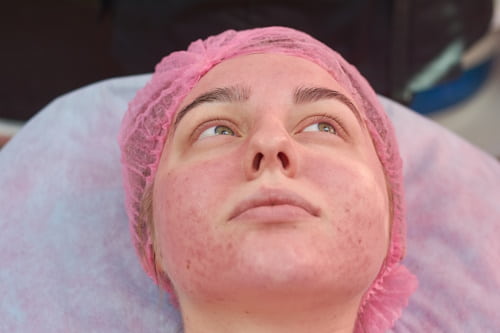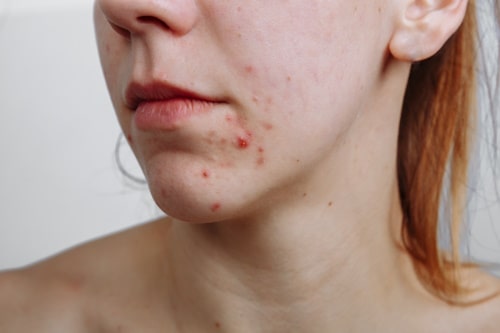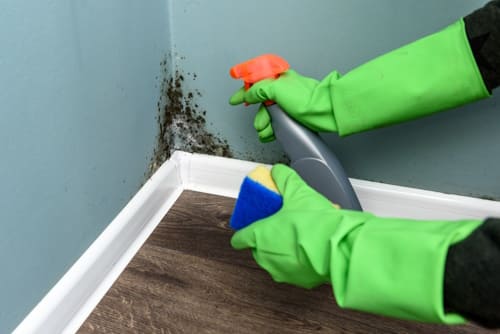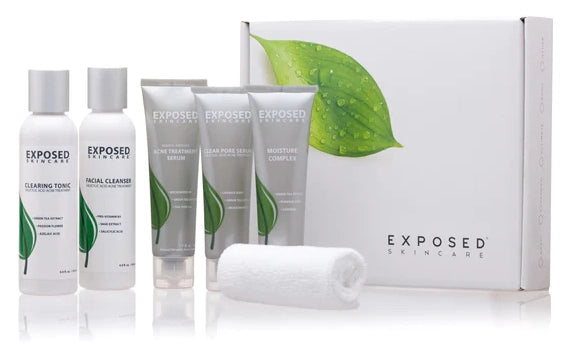Numerous factors can cause skin problems, such as acne. One lesser-known cause is mold. For skin-conscious people who live in humid places, the question "Can mold cause acne?" often arises.
This article explores the relationship between mold and acne and how mold might affect your skin's health. Continue reading to get that smooth and radiant skin you have always wanted.
Also read: How to choose the best acne treatment
Biggest Take-Aways:
- Mold exposure can significantly impact skin health, leading to conditions like acne through inflammation and hormonal disruptions.
- Certain types of mold, especially black mold, are especially harmful due to the mycotoxins they produce.
- A holistic approach, understanding both external and internal factors, is crucial in addressing mold-related skin challenges.
- Exposed Skin Care offers a comprehensive solution to tackle mold-related acne, focusing on the root causes and providing targeted treatments.

Mold and Its Impact on the Skin
What is Mold?
Mold is a type of fungus that thrives in damp, humid environments. Consisting of tiny spores, mold can spread easily and rapidly, leading to potential health risks if left untreated.
Mold Exposure and Skin Problems
It's often said that our environment can significantly impact our health. When it comes to skin, the harmful effects of mold exposure can lead to various issues. Common symptoms of mold exposure include rash, itching, and inflammation. While mold exposure may not be the root cause, it can exacerbate conditions like eczema and rosacea.
Certain types of mold, notably black mold or Stachybotrys, produce mycotoxins that can cause skin irritation when in contact with the skin. This irritation can manifest as hives or other inflammatory skin conditions, potentially leading to acne outbreaks.
Mold-Related Illness and its Link to Acne
Chronic inflammatory response syndrome (CIRS), often related to mold exposure, is characterized by various symptoms. Skin issues such as rashes, hives, and acne are commonly found among these symptoms.

The mold-related illness might be a potential cause for some who suffer from persistent acne lesions unrelated to common triggers.
Delving Deeper: How Mold Might Cause Acne
Inflammation and Acne
Inflammation is a key factor when it comes to skin problems. Exposure to toxic mold, especially certain types of mold, can cause inflammation in the body. This inflammation, when it comes to skin, can lead to acne breakouts.
Mold and Hormonal Imbalances
Mold exposure may impact the endocrine system, leading to hormone imbalances. This hormonal imbalance can exacerbate acne by causing an overproduction of sebum, the oil our skin produces. Excess sebum and dead skin cells can clog hair follicles, leading to acne.
The Functional Medicine Perspective
From a functional medicine standpoint, the health of our internal systems is intricately linked to our external health. The impact of mold exposure, especially exposure to toxic mold, can lead to chronic illness that manifests on the skin. This can include acne breakouts, lines, and wrinkles, and more.
Mycotoxins and Acne
Mycotoxins produced by certain types of mold can cause cystic acne. When these toxins come into contact with the skin, they can damage the skin at a cellular level, leading to inflammation and acne.

Mold and Other Skin Conditions
Fungal Folliculitis
Beyond traditional acne, mold exposure can lead to fungal skin infections, including folliculitis. This condition is characterized by inflammation of the hair follicles, often causing itchy, pimple-like bumps.
Mold and Skin Rashes
Direct contact with mold spores or mold thrives in a moist environment can lead to skin rashes. These rashes might be mistaken for other skin conditions but could be a sign of exposure to mold.
Eczema, Rosacea, and Mold
While not the root cause, mold can exacerbate conditions like eczema and rosacea. The irritation from mold exposure can make these conditions more severe, causing flare-ups and increased skin symptoms.
Prevention and Skin Care
Environment and Lifestyle Changes
A vital step in preventing mold-related skin problems is to address any water damage or damp areas in your home. Mold thrives in humid environments, so keeping your space dry and well-ventilated is essential.

Skincare Products for Mold-Related Skin Issues
Incorporating specific skincare products into your routine can help address skin problems due to mold. Topical treatments like benzoyl peroxide and retinoid creams can target acne lesions caused by mold.
Using topical products that exfoliate and renew skin cells promotes healthy skin and can help to prevent the recurrence of mold-related acne outbreaks.
Inside-Out Approach
For those suffering from symptoms of mold exposure, including acne, it might be beneficial to consider a holistic approach. Addressing internal factors, like a leaky gut or imbalance in sebum production, in tandem with the right skincare products can be a path to clearer, healthy skin.
Benefits of Using Exposed Skin Care for Acne Management
Managing acne requires understanding its root causes. In some cases, acne is caused by factors like hormonal imbalances, while in others, it could be an outcome of mold issues or even mold-related illnesses due to toxic mold exposure. Whatever the case, Exposed Skin Care comes to the rescue.
Here are some compelling benefits of Exposed Skin Care:
- Targeted Solutions: Exposed Skin Care incorporates ingredients that work against bacteria and other external causes, often responsible for breakouts.
- Holistic Approach: Recognizing that acne can be an external transcription of internal issues, Exposed products can be combined with oral antibiotics when necessary, offering a comprehensive solution.
- Hormonal Balance: Products in the range can assist in regulating hormone levels, tackling one of the major contributors to acne.
- Refreshing Experience: Using Exposed Skin Care offers a break from the musty challenges of mold, providing skin rejuvenation and relief.
Opting for Exposed Skin Care can pave the way for clearer skin, even when confronting mold challenges.
Conclusion
The intricate relationship between mold and our skin health is fascinating and alarming. Understanding that there is a potential link between mold exposure and acne sheds light on the many factors contributing to our skin's overall health.
It is crucial to acknowledge that our external appearance often reflects internal disturbances. Mold-related illness is a testament to this, manifesting externally with symptoms such as acne and rashes.
Navigating the complexities of mold issues, particularly when it comes to our skin, requires a holistic approach. This involves understanding the root causes, taking preventative measures, and using the right products to combat these skin challenges.
Fortunately, comprehensive solutions like Exposed Skin Care are available. Its products tackle the visible symptoms and address the underlying factors, ensuring we are better equipped to manage and overcome the challenges posed by mold-related skin problems.
FAQs
What is the connection between mold and acne?
Mold exposure can lead to inflammation and hormonal imbalances, exacerbating or leading to acne breakouts.
Are there specific types of mold that are worse for the skin?
Yes, certain types, like black mold or Stachybotrys, produce mycotoxins that can cause severe skin irritation and conditions.
How does mold cause inflammation in the body?
Mold, especially toxic mold types, releases mycotoxins that can trigger inflammatory responses in the body, leading to conditions like acne.
What are some common symptoms of mold-related illness?
Symptoms include skin issues like rashes and hives, brain fog, shortness of breath, and certain patterns of health disturbances.
How can Exposed Skin Care help with mold-related acne issues?
Exposed Skin Care offers targeted solutions that work against acne-causing bacteria, provides a holistic approach by considering internal factors, and helps regulate hormone levels, making it effective against mold-related acne challenges.



















